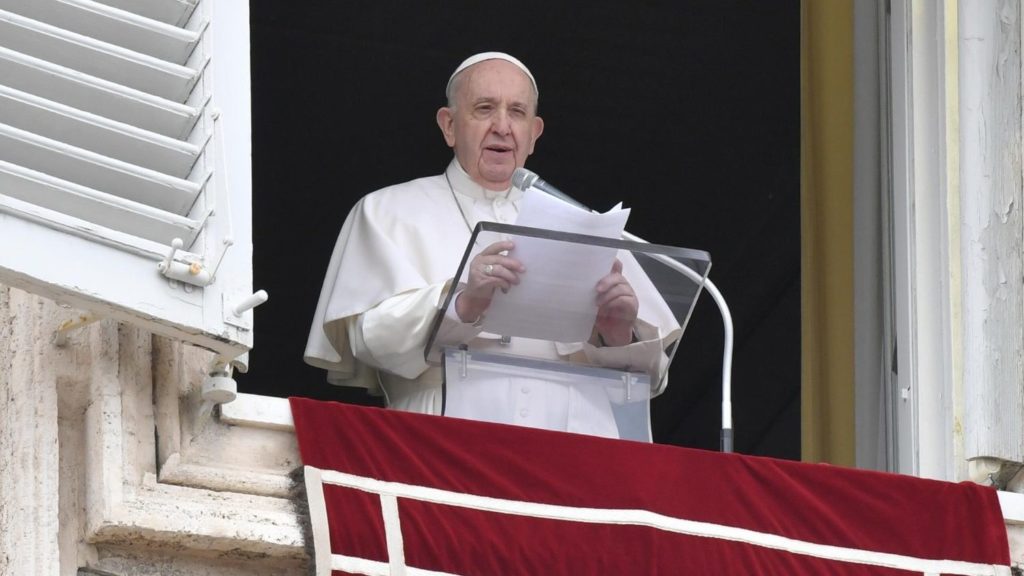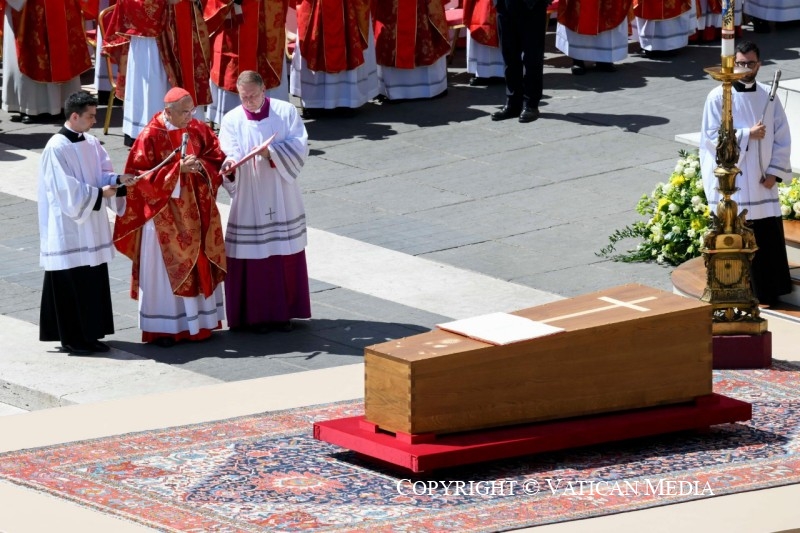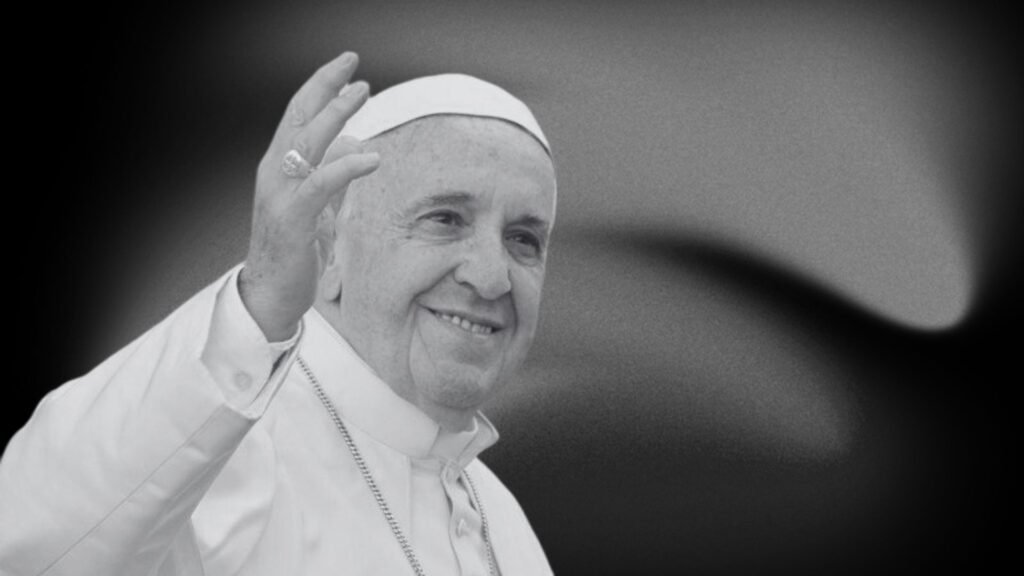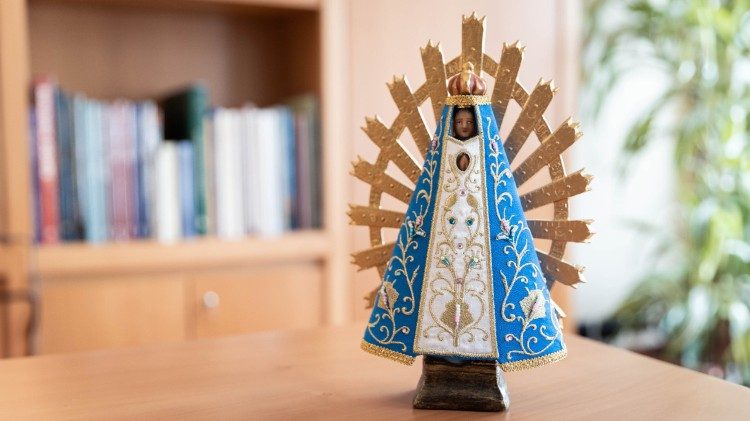Pope: Parables Speak Through Everyday Life
A Mustard Seed and a Farmer Sowing

Jesus used parables that speak through everyday life, opening the mystery of God.
This was at the core of Pope Francis’ commentary today at the reciting of the noonday Angelus with the faithful in St. Peter’s Square.
“The two parables, which the Liturgy presents us today, – the two parables – are inspired precisely by ordinary life and reveal the attentive and deep gaze of Jesus, who observes reality and, through small everyday images, opens the windows on the mystery of God and on the succession of human events. Jesus spoke in a way that was easy to understand; he spoke with images of reality, of everyday life,” the Holy Father said. “n this way, he teaches us that even everyday things, which at times all seem the same and which we carry on with distraction or effort, are inhabited by God’s hidden presence; that is, they have meaning.”
The Pope recalled the two famous parables, both involving seeds:
- “Today Jesus compares the Kingdom of God, that is, his presence that dwells in the heart of things and of the world, to the mustard seed, that is, to the smallest seed there is: it is really tiny. Yet, cast upon the ground, it grows until becoming the tallest tree (cf. Mk 4:31-32).
- “In the Church too, weeds of doubt can take root, especially when we witness the crisis of faith and the failure of different projects and initiatives. But let us never forget that the results of sowing do not depend on our abilities: they depend on the action of God…Jesus explains it in today’s other parable: the farmer sows the seed and then does not realize how it bears fruit, because it is the seed itself that grows spontaneously, day and night when he least expects it (cf. vv. 26-29).”
The Holy Father concluded with a message of hope: “With God in the most infertile soil, there is always the hope of new sprouts.”
Following is the Pope’s full Angelus commentary, provided by the Vatican:
Dear Brothers and Sisters, Buongiorno!
The two parables, which the Liturgy presents us today, – the two parables – are inspired precisely by ordinary life and reveal the attentive and deep gaze of Jesus, who observes reality and, through small everyday images, opens the windows on the mystery of God and on the succession of human events. Jesus spoke in a way that was easy to understand; he spoke with images of reality, of everyday life. In this way, he teaches us that even everyday things, which at times all seem the same and which we carry on with distraction or effort, are inhabited by God’s hidden presence; that is, they have meaning. So, we too need attentive eyes, to be able “to seek and find God in all things.
Today Jesus compares the Kingdom of God, that is, his presence that dwells in the heart of things and of the world, to the mustard seed, that is, to the smallest seed there is: it is really tiny. Yet, cast upon the ground, it grows until becoming the tallest tree (cf. Mk 4:31-32). This is what God does. At times, the din of the world, along with the many activities that fill our days, prevent us from stopping and seeing how the Lord is conducting history. Yet – the Gospel assures us – God is at work, like a good little seed that silently and slowly germinates. And, little by little, it becomes a lush tree, which gives life and rest to everyone. The seed of our good works too can seem like a small thing, yet all that is good pertains to God, and thus it humbly, slowly bears fruit. Good, let us remember, always grows in a humble way, in a hidden, often invisible way.
Dear brothers and sisters, with this parable Jesus wants to instill us with confidence. In so many of life’s situations, indeed, it may happen that we get discouraged because we see the weakness of good as compared to the apparent power of evil. And we may allow ourselves to be paralyzed by doubt when we find we are working hard but the results are not achieved, and things seem never to change. The Gospel asks us to take a fresh look at ourselves and at reality; it asks us to have bigger eyes, that are able to see further, especially beyond appearances, in order to discover the presence of God who as humble love is always at work in the soil of our life and that of history. This is our confidence, this is what gives us the strength to go forward every day, patiently, sowing the good that will bear fruit.
How important this attitude also is for coming out of the pandemic well! To cultivate the confidence of being in God’s hands and at the same time for all of us to commit ourselves to rebuilding and starting up again, with patience and perseverance.
In the Church too, weeds of doubt can take root, especially when we witness the crisis of faith and the failure of different projects and initiatives. But let us never forget that the results of sowing do not depend our abilities: they depend on the action of God. It is up to us to sow, and sow with love, with dedication, and with patience. But the force of the seed is divine. Jesus explains it in today’s other parable: the farmer sows the seed and then does not realize how it bears fruit, because it is the seed itself that grows spontaneously, day and night when he least expects it (cf. vv. 26-29). With God in the most infertile soil, there is always the hope of new sprouts.
May Mary Most Holy, the Lord’s humble handmaid, teach us to see the greatness of God who works in the little things and to overcome the temptation of discouragement. Let us trust in Him every day!
After the Angelus, the Holy Father continued:
Dear brothers and sisters! I am especially close to the population of the Tigray region in Ethiopia, struck by a grave humanitarian crisis that could expose the poorest people to famine. Today there is famine; there is famine there. Let us pray together that the violence may cease immediately, that food and health assistance be guaranteed to everyone, and that social harmony be restored as soon as possible. In this regard, I thank all those who work to alleviate the people’s suffering. Let us pray to Our Lady for these intentions. Hail Mary….
Yesterday, World Day Against Child Labour was celebrated. It is not possible to close our eyes before the exploitation of children, deprived of the right to play, to study, and to dream. According to the estimates of the International Labour Organization, more than 150 million children are exploited by labor: this is a tragedy! 150 million: more or less like the inhabitants of Spain, together with France and Italy. This is happening today! So many children who suffer this: exploited by child labor. Let us all together renew the effort to eliminate this slavery of our times.
This afternoon in Augusta, Sicily, the ceremony will be held for the arrival of the remains of the boat from the shipwreck of 18 April 2015. May this symbol of so many tragedies in the Mediterranean Sea continue to challenge everyone’s conscience and foster the growth of a more supportive humanity, that tears down the wall of indifference. Let us think: the Mediterranean has become Europe’s largest cemetery.
Tomorrow is World Blood Donor Day. I sincerely thank the volunteers and I encourage them to continue their work, bearing witness to the values of generosity and gratuitousness. Thank you very much, thank you!
And I cordially greet all of you, coming from Rome, from Italy, and from other countries; in particular, the pilgrims who arrived on bicycle from Sedigliano and from Bra, the faithful from di Forlì and those from Cagliari.
I wish everyone a happy Sunday. And please, do not forget to pray for me. Enjoy your lunch! Arrivederci!
© Libreria Editrice Vatican
Related

Mercy and the joy of the Gospel are two key concepts of Pope Francis
Exaudi Staff
26 April, 2025
9 min

Thousands of faithful bid farewell to Pope Francis in St. Peter’s Square
Exaudi Staff
26 April, 2025
2 min

Saying Goodbye to Francis
Exaudi Staff
26 April, 2025
2 min

Pope Francis Gifts a Statue of Our Lady of Luján to Gemelli and the Catholic University of the Sacred Heart
Exaudi Staff
25 April, 2025
2 min
 (EN)
(EN)
 (ES)
(ES)
 (IT)
(IT)

